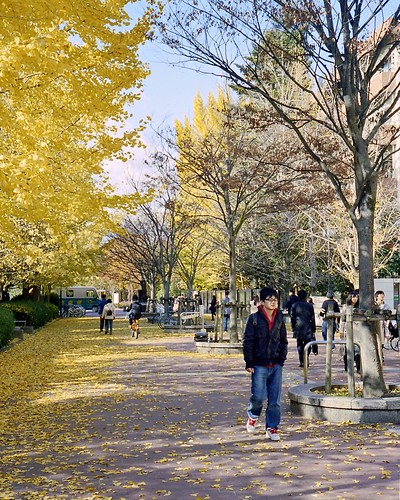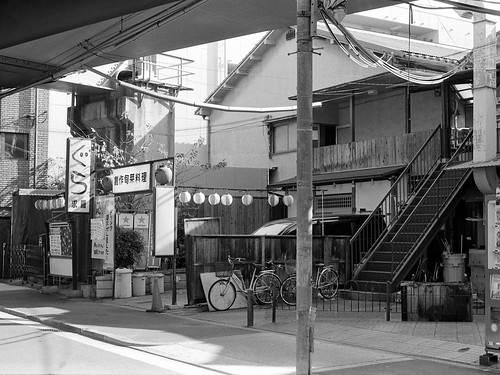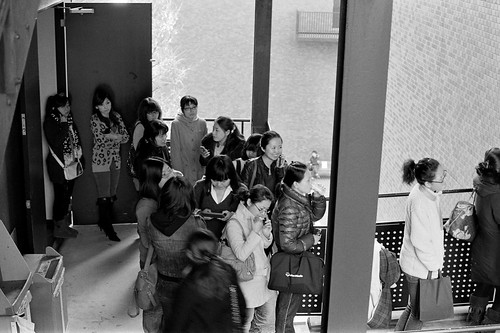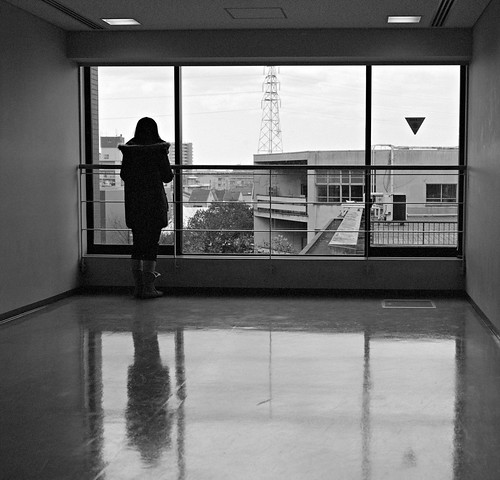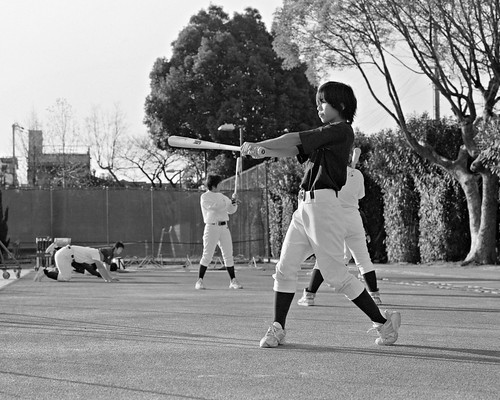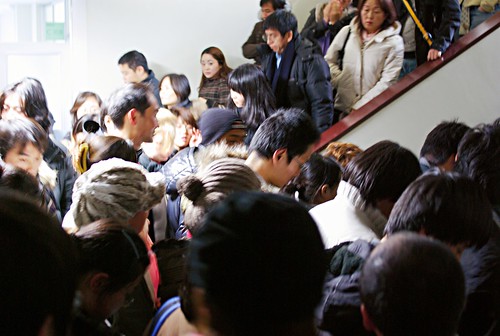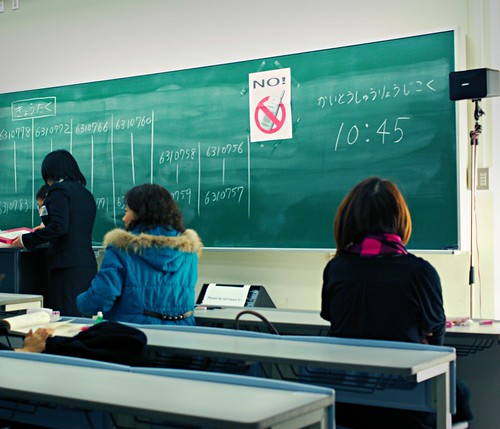The JLPT results are in, and I didn't pass. But it was close — 94/180 points, just six points from the passing score of 100. I had very nearly the same score on all sections so I'm not particularly lacking in any one area. With proper test preparation I would likely have passed it. So, beginning in April or thereabouts I will temporarily shift my studies towards the JLPT and then take the test either in July or in December.
It's not important for me to pass level 1, but it'd be nice to have it done with, and having my Japanese documented could come in handy some day.
Showing posts with label JLPT. Show all posts
Showing posts with label JLPT. Show all posts
Wednesday, February 15, 2012
Monday, February 14, 2011
Son of Return of Revenge of the JLPT1
The Japanese Language Proficiency test results are in, and as expected I failed. Like last year, and like the year before that.
The test was on the eastern side of Osaka, so I got to go on the Imazato subway line for the first time. It's the newest line in Osaka, and like the Tsurumi-Ryoukushi line it's a linear motor system. The center line on the tracks here is effectively the stator while the train itself is the rotor in a flattened-out electric motor. Look at it go - Wheeee!!!
I didn't study at all for the test, and I didn't aim to pass it in the first place. Like those previous years, I took level 1 as a practice test. This year was the first time with the new scoring system1 which makes it difficult to compare with previous years. I do intend to try for real next year - but then, I said the same thing last year and ended up with no time to do so.
Higashi Osaka has a town-y feel to it. It's the kind of place where events seem to pass it by without ever really affecting it. This is a restaurant under the Shinkansen tracks that pass through the city.
I did so-so. Not good - I didn't pass after all - but not a complete disaster either. You have three sections nowadays, with a maximum of 60 points for each. You need to get at least 19 points in each section, and 100 (out of 180) in total to pass. I got 21/60 for vocabulary and grammar; 31/60 for reading and 26/60 for listening. I passed the section minimums, but I would have needed 33-34 points in each section to pass overall. The tests are really not comparable any more but that said, two years ago my score was only 61% of the passing score, last year was 70%, and this year was 78%. If the trend holds I'll pass the test in 2013.
The test was at the University of Economics. Large crowds and breaks at about the same time for everyone mean long lines to the bathrooms for the female test takers.
My strong point is reading. It keeps improving and it's now on par with my listening; I guess reading the Asahi Shimbun on the train every morning really helps.
Grammar - well, I suck at that. It's not just Japanese - I suck at English and Swedish grammar too, and I've yet to grasp simple things such as the difference between adverbs and adjectives. Sure, I'll keep struggling through grammar exercise books but really, it doesn't really seem to improve my understanding. I eventually mastered English grammar simply by reading and hearing enough of it to internalize the correct patterns. I suspect the same thing will eventually happen with Japanese too.
I love this retro-futuristic karaoke-sign in Higashi Osaka. Who wouldn't want to experience Hyper-Karaoke at least once in their life?
The test was on the eastern side of Osaka, so I got to go on the Imazato subway line for the first time. It's the newest line in Osaka, and like the Tsurumi-Ryoukushi line it's a linear motor system. The center line on the tracks here is effectively the stator while the train itself is the rotor in a flattened-out electric motor. Look at it go - Wheeee!!!
I didn't study at all for the test, and I didn't aim to pass it in the first place. Like those previous years, I took level 1 as a practice test. This year was the first time with the new scoring system1 which makes it difficult to compare with previous years. I do intend to try for real next year - but then, I said the same thing last year and ended up with no time to do so.
Higashi Osaka has a town-y feel to it. It's the kind of place where events seem to pass it by without ever really affecting it. This is a restaurant under the Shinkansen tracks that pass through the city.
I did so-so. Not good - I didn't pass after all - but not a complete disaster either. You have three sections nowadays, with a maximum of 60 points for each. You need to get at least 19 points in each section, and 100 (out of 180) in total to pass. I got 21/60 for vocabulary and grammar; 31/60 for reading and 26/60 for listening. I passed the section minimums, but I would have needed 33-34 points in each section to pass overall. The tests are really not comparable any more but that said, two years ago my score was only 61% of the passing score, last year was 70%, and this year was 78%. If the trend holds I'll pass the test in 2013.
The test was at the University of Economics. Large crowds and breaks at about the same time for everyone mean long lines to the bathrooms for the female test takers.
My strong point is reading. It keeps improving and it's now on par with my listening; I guess reading the Asahi Shimbun on the train every morning really helps.
Grammar - well, I suck at that. It's not just Japanese - I suck at English and Swedish grammar too, and I've yet to grasp simple things such as the difference between adverbs and adjectives. Sure, I'll keep struggling through grammar exercise books but really, it doesn't really seem to improve my understanding. I eventually mastered English grammar simply by reading and hearing enough of it to internalize the correct patterns. I suspect the same thing will eventually happen with Japanese too.
I love this retro-futuristic karaoke-sign in Higashi Osaka. Who wouldn't want to experience Hyper-Karaoke at least once in their life?
#1 The points are no longer directly connected to the number of correct answers. The new test uses something called Item Response Theory to score the test.
The basic idea is - I think - that you determine the difficulty score of each question by how many people answered correctly. The score represents the level of knowledge - the higher the score the more you know. So the difficulty score of a question is the level of knowledge that the question tests - half the people with a knowledge level at that exact score will get it right, half will not.
Then you look at all the questions each individual test taker got right or wrong, and you determine statistically which score would be most likely to give this pattern of results. That score is the score you get on the test.
Why do it this way? It's more reliable. Your score will be the same whether you get an easy test or a difficult one, and you can even compare your score with other tests as long as the other tests use the same scoring system.
The basic idea is - I think - that you determine the difficulty score of each question by how many people answered correctly. The score represents the level of knowledge - the higher the score the more you know. So the difficulty score of a question is the level of knowledge that the question tests - half the people with a knowledge level at that exact score will get it right, half will not.
Then you look at all the questions each individual test taker got right or wrong, and you determine statistically which score would be most likely to give this pattern of results. That score is the score you get on the test.
Why do it this way? It's more reliable. Your score will be the same whether you get an easy test or a difficult one, and you can even compare your score with other tests as long as the other tests use the same scoring system.
Monday, December 6, 2010
JeyEllPeeTee
Oh yes, the season of the Japanese Language Proficiency test is upon us once again. Yesterday was the first time I took the new, redesigned test. I no longer fail 1-kyuu; I now fail N1 instead. Same level, different name.
And different test. It's still a multiple-choice exam, and the overall questions are quite similar but there the similarity ends. The old test had three parts: vocabulary and kanji; listening; and reading and grammar. The new test puts vocabulary, kanji, reading and grammar into one section, with listening as the other one.
The test is, I believe, a fair bit shorter than before. It now starts after lunch and takes only four hours including a half-hour break. The listening section is as long as before, and possibly a bit more difficult. The picture questions are gone, instead there's a fast section with single sentences followed by possible responses. It's really more a test of knowing your expressions and reading tone than of simple comprehension. There are a few longer, more involved passages that really tax your ability to remember who is saying what (I failed miserably; I just can't keep long passages straight in my head).
The reading is as long as before, or longer. There must have been a dozen texts of various lengths, with questions both on the overall meaning and of specific expressions. The texts seemed to be "real" writing, without much editing for the test; overall a little easier than the Asahi Shinbun articles I try to read in the mornings but not by much. The last question was a page from an application form for financial grants to foreign post-graduate students, and you had to figure out which of a set of candidates would be eligible to receive the money, and what a specific candidate had to do before they could apply. I really suck at administrativia like this in any language so I'm pretty sure I messed this one up as well.
What has become shorter is grammar and vocabulary, to some extent, and especially kanji. There were none of the puzzle-like questions of the older test ("Select the answer sentence that has an underlined compound kanji word with the same pronunciation as the underlined compound word in the question sentence"), and there were overall fewer simple knowledge questions. Of course, the reading and listening parts all make heavy demand on kanji, vocabulary and grammar so it's still tested a lot, just not as much in isolation.
Overall, I think the new test is much better balanced. The focus (at least at level N1) is properly on comprehension and use of real-life Japanese, with less focus on memorizing facts for their own sake. If there is anything still missing, it would be a test of actual language production. Many language tests do have an essay-writing section or a live interview, but that would probably increase the cost too much to be realistic.
For my test, I did feel I know this a bit better than last year, but the test also seems a bit harder. The scoring system has completely changed, though, so I really have no idea how well I'll do. I did fail, but I don't know how badly. Anyway, I think it's time for me to try it for real next time around. I'll get an exam practice book and start studying for the test once my workload drops a little, then try to pass the thing next December.
And different test. It's still a multiple-choice exam, and the overall questions are quite similar but there the similarity ends. The old test had three parts: vocabulary and kanji; listening; and reading and grammar. The new test puts vocabulary, kanji, reading and grammar into one section, with listening as the other one.
The test is, I believe, a fair bit shorter than before. It now starts after lunch and takes only four hours including a half-hour break. The listening section is as long as before, and possibly a bit more difficult. The picture questions are gone, instead there's a fast section with single sentences followed by possible responses. It's really more a test of knowing your expressions and reading tone than of simple comprehension. There are a few longer, more involved passages that really tax your ability to remember who is saying what (I failed miserably; I just can't keep long passages straight in my head).
The reading is as long as before, or longer. There must have been a dozen texts of various lengths, with questions both on the overall meaning and of specific expressions. The texts seemed to be "real" writing, without much editing for the test; overall a little easier than the Asahi Shinbun articles I try to read in the mornings but not by much. The last question was a page from an application form for financial grants to foreign post-graduate students, and you had to figure out which of a set of candidates would be eligible to receive the money, and what a specific candidate had to do before they could apply. I really suck at administrativia like this in any language so I'm pretty sure I messed this one up as well.
What has become shorter is grammar and vocabulary, to some extent, and especially kanji. There were none of the puzzle-like questions of the older test ("Select the answer sentence that has an underlined compound kanji word with the same pronunciation as the underlined compound word in the question sentence"), and there were overall fewer simple knowledge questions. Of course, the reading and listening parts all make heavy demand on kanji, vocabulary and grammar so it's still tested a lot, just not as much in isolation.
Overall, I think the new test is much better balanced. The focus (at least at level N1) is properly on comprehension and use of real-life Japanese, with less focus on memorizing facts for their own sake. If there is anything still missing, it would be a test of actual language production. Many language tests do have an essay-writing section or a live interview, but that would probably increase the cost too much to be realistic.
For my test, I did feel I know this a bit better than last year, but the test also seems a bit harder. The scoring system has completely changed, though, so I really have no idea how well I'll do. I did fail, but I don't know how badly. Anyway, I think it's time for me to try it for real next time around. I'll get an exam practice book and start studying for the test once my workload drops a little, then try to pass the thing next December.
Friday, February 5, 2010
JLPT 1 Results - and Pictures
It looks to become a yearly tradition, this: A year ago I took the JLPT 1, the Japanese proficiency exam, and failed it. This year I again took the JLPT 1 - and failed it.
Failing it is fine by me, and I didn't expect otherwise. I had a vague idea that I'd start preparing for the JLPT a bit after last year, but I've since started a new job and a new project that's kept me rather busy. It's been a struggle just to keep to regular language lessons every two weeks; test preparation has been far from my mind.
A trio of fellow examinees, probably from India (check the bag on the left if you need convincing), taking the test somewhat more seriously than I did.
So how did I do? 196 points out of 400, or just about half. And all three parts - kanji and vocab, listening, and reading and grammar - individually reached the halfway mark too. If we do the (overly simplified, not-to-be-relied on) analysis I did last year, I "knew" 128 points worth of questions this year compared to 93 a year ago1. The improvement (if there actually was any) was completely in the reading section; that would make sense as most of my limited study time this year has been spent reading.
Next year I'm going to take the test for real. Not pass it, perhaps, but at least make a serious attempt. I'm going to ignore the listening, as I already listen to Japanese all day, every day, after all. I've begun reviewing the vocabulary and kanji2. My regular book habit on the train every morning should cover the reading. Soon I'll start going through the grammar as well; not a prospect that fills me with unalloyed joy, exactly, but there's no helping it I guess.
I don't have the time to really go through everything by December, but I should be able to get within shouting distance of a passing score. The big question for next year is the new test format. The JLPT is changing, with a new intermediate level and the new level 1 is reportedly going to be slightly more difficult. There's also rumours that the new test will require a passing score on each of the subsections, not just an overall pass. If that is true then it's a welcome change, but it would also make the test substantially harder. We'll see, I guess.
Practice makes perfect. A baseball team at Osaka International University, where the test was held this year.
Kayashima station, near the test site, is pretty cool. The line and platform is elevated, and there's a large tree growing right through the platform and up through the roof above. I like this area for this reason alone
---
Failing it is fine by me, and I didn't expect otherwise. I had a vague idea that I'd start preparing for the JLPT a bit after last year, but I've since started a new job and a new project that's kept me rather busy. It's been a struggle just to keep to regular language lessons every two weeks; test preparation has been far from my mind.
A trio of fellow examinees, probably from India (check the bag on the left if you need convincing), taking the test somewhat more seriously than I did.
So how did I do? 196 points out of 400, or just about half. And all three parts - kanji and vocab, listening, and reading and grammar - individually reached the halfway mark too. If we do the (overly simplified, not-to-be-relied on) analysis I did last year, I "knew" 128 points worth of questions this year compared to 93 a year ago1. The improvement (if there actually was any) was completely in the reading section; that would make sense as most of my limited study time this year has been spent reading.
Next year I'm going to take the test for real. Not pass it, perhaps, but at least make a serious attempt. I'm going to ignore the listening, as I already listen to Japanese all day, every day, after all. I've begun reviewing the vocabulary and kanji2. My regular book habit on the train every morning should cover the reading. Soon I'll start going through the grammar as well; not a prospect that fills me with unalloyed joy, exactly, but there's no helping it I guess.
I don't have the time to really go through everything by December, but I should be able to get within shouting distance of a passing score. The big question for next year is the new test format. The JLPT is changing, with a new intermediate level and the new level 1 is reportedly going to be slightly more difficult. There's also rumours that the new test will require a passing score on each of the subsections, not just an overall pass. If that is true then it's a welcome change, but it would also make the test substantially harder. We'll see, I guess.
Practice makes perfect. A baseball team at Osaka International University, where the test was held this year.
Kayashima station, near the test site, is pretty cool. The line and platform is elevated, and there's a large tree growing right through the platform and up through the roof above. I like this area for this reason alone
---
#1 This is accurate only if you assume that I guessed exactly 1/4 of the unknown answers correctly. If we wanted to know if I really improved, we would need to take the expected random variation of answers into account and see if this improvement is likely to be due just to chance or not. That starts looking uncomfortably like work, however, so I happily leave it as an exercise for those who are interested.
#2 On the off chance that you intend to take any of the lower levels (n5 to n3) of the JLPT this year, here's a tip: when you study the kanji, take the time to memorize all the normal readings and meanings, not just the ones you need for your test level. You will thank yourself when you study for level 1 a couple of years down the road.
But you'll also find it immediately useful once you start reading real texts. They don't restrict themselves to the readings you learn for the JLPT, and there's few things as annoying as when you know the character but still have to stop and look up the reading. If you know the full range of readings it becomes much easier to start a reading habit and to pick up new vocabulary.
But you'll also find it immediately useful once you start reading real texts. They don't restrict themselves to the readings you learn for the JLPT, and there's few things as annoying as when you know the character but still have to stop and look up the reading. If you know the full range of readings it becomes much easier to start a reading habit and to pick up new vocabulary.
Sunday, December 6, 2009
JLPT 1
Yes, it's the time of year again, when the leaves have fallen, when the rain turns cold and miserable, and when people's thoughts turn towards the year-end parties and the coming holiday - and when foreigners throughout the country gather to take the Japanese Language Proficiency Test. Like last year I took the level 1 test, and like last year I'm going to fail.
Which is fine; I took it just for practice. Unlike last year, however, it didn't feel impossible. I have a decent idea on what parts of the language need improvement (everything) and how much more I need to improve (a lot.) The JLPT is being remade next year, with a new level in between the current 2 and 3, a somewhat different scoring system, and new names for the levels. Oh, and level 1 will reportedly become slightly harder.
So I figure that to the extent passing level 1 has any meaning1 I might as well take the new test rather than the old. My current plan is to make a real attempt on level one this time next year, and if/when I fail that, try again in June next year. Of course, the vagaries of life can and will interfere (when work and study competes for attention work wins every time) but that's the plan at least. I've already started going through the vocabulary and kanji "for real". We'll see.
--
Which is fine; I took it just for practice. Unlike last year, however, it didn't feel impossible. I have a decent idea on what parts of the language need improvement (everything) and how much more I need to improve (a lot.) The JLPT is being remade next year, with a new level in between the current 2 and 3, a somewhat different scoring system, and new names for the levels. Oh, and level 1 will reportedly become slightly harder.
So I figure that to the extent passing level 1 has any meaning1 I might as well take the new test rather than the old. My current plan is to make a real attempt on level one this time next year, and if/when I fail that, try again in June next year. Of course, the vagaries of life can and will interfere (when work and study competes for attention work wins every time) but that's the plan at least. I've already started going through the vocabulary and kanji "for real". We'll see.
--
#1 A lot of people seem to really overestimate the value of a JLPT1 certificate. Here's a bit of reality: If Japanese proficiency is important for a job, then having JLPT1 or JLPT2 may make the difference between landing a job interview and not doing so. But that's it - no interviewer, in Japan or abroad, is going settle with a test score. They'll make sure you actually can use the language, including conversation and writing which are not covered by the test. Actually knowing the language is critical in other words; having a test certificate is much less so. "Studying for the test" is relly pointless in this case.
And if Japanese is not important then a JLPT test certificate is much like being treasurer at your local photography club, or having a forklift licence - it makes for a nicely rounded CV but it's not going to have any material effect.
And if Japanese is not important then a JLPT test certificate is much like being treasurer at your local photography club, or having a forklift licence - it makes for a nicely rounded CV but it's not going to have any material effect.
Wednesday, February 18, 2009
JLPT 1 Results
I got the results from the JLPT (Japanese Language Proficiency Test) level 1 that I took in December. Results are pretty much what I expected, if a little low: 170 out of 400, with 280 as the passing grade.
Not bad. Remember, I took this test before I started studying level 1 material; this is the baseline of what I already know on the test before doing any preparation or studying whatsoever. Since you can expect to score about 100 points by pure chance, I was effectively able to answer 93 points out of 400, with the needed "real" points at 240.1
I'll be taking the test again in December. As I'm not specifically studying for the JLPT I'm not likely to pass on that attempt either, but I should see a nice bump in the score.
--
Not bad. Remember, I took this test before I started studying level 1 material; this is the baseline of what I already know on the test before doing any preparation or studying whatsoever. Since you can expect to score about 100 points by pure chance, I was effectively able to answer 93 points out of 400, with the needed "real" points at 240.1
I'll be taking the test again in December. As I'm not specifically studying for the JLPT I'm not likely to pass on that attempt either, but I should see a nice bump in the score.
--
#1 For those not so mathematically inclined, it's easy to figure out: Let's say the score we got is s, or 170 points. Then, let's say the number of points we actually knew, not guessed, is k. This is what we want to find out. There's four answers to choose from, so about 1/4 of answers we guess at will be correct.
We know that the score s we got (170 points) consists of answers k we actually knew plus 1/4 of the remaining answers (400-k) that we guessed at. we get:

Which comes out to 93 points I knew with a score of 170, and as level 1 requires a 280 point score to pass we'd need to know 240 points worth of answers to have an even chance of passing. For comparison, the passing score is 240 for level 2-4, and that implies you need to know about 187 points to pass. That means the level 1 test actually requires you to know about 28% more of the test material than the lower levels do, a pretty significant difference.
We know that the score s we got (170 points) consists of answers k we actually knew plus 1/4 of the remaining answers (400-k) that we guessed at. we get:

Which comes out to 93 points I knew with a score of 170, and as level 1 requires a 280 point score to pass we'd need to know 240 points worth of answers to have an even chance of passing. For comparison, the passing score is 240 for level 2-4, and that implies you need to know about 187 points to pass. That means the level 1 test actually requires you to know about 28% more of the test material than the lower levels do, a pretty significant difference.
Monday, December 8, 2008
JLPT 1
Yes, it's this time of year again, when Japanese learners of all levels leave their solitary dens to gather and mingle like lemmings, if lemmings were to mingle in unheated university lecture halls on an early Sunday morning in December. And today, after one years absence, I gathered with all the rest.
As I accidentally passed level 2 two years ago, my next - and last - level is level 1. I plan to try to take it next year, and so I took level 1 now just to have a base of comparison. That means I did no studying or preparation whatsoever for this year, not even looking at an earlier test; I want to see what I know and what I don't. So of course I'll flunk this one. That's OK; it's on purpose.
This is not an easy event to photograph. Worn classrooms aren't intrinsically photogenic, and I think it'd be impolite and perhaps even a breach of privacy to post an easily recognizable image of a test-taker. Oh well.
First of all, kanji and vocabulary. It is a lot more difficult than level 2 was and I didn't stand a chance. This is the most criticized part of the level 1 test as the questions frequently go beyond just testing your knowledge and into the realm of word puzzles. You may be asked to match words using the same kanji given only their pronunciation, for instance. Ugh. Some practice is called for here. So far my kanji studies have been piecemeal and ad hoc; it seems I'll need a more structured approach the coming year.
The listening part went so-so; not very difficult as such, but I did miss a fair few questions due to my deficient vocabulary. I didn't expect to have to work a lot on my listening and it looks like I won't have to.
Reading was the positive surprise of the day. I managed to pass level 2 mainly on the strength of this section and again I did a lot better than I thought I would. Spending every weekday morning the past couple of years with my nose in a book has been paying off I guess. Again my limited vocabulary tripped me up a lot, but I even though I thought I was too slow in reading everything I still managed to have almost 40 minutes left for the grammar section. Again, I won't need any specific reading practice for next year.
The grammar... I've never enjoyed studying grammar, and I've only just started covering the frequently obscure or rare grammar that comes up at this level. I actually knew a couple of the grammar questions, could make informed guesses on some but basically just answered most of them completely at random. I really need to get to work on this.
The maximum score is 400, and the passing score is 280. If you just guess on everything you can expect around 100 points. Me, I should have somewhere around 150-180 points or so I think. Which is fine - the lower my current score, the more I'll have improved when I retake it next year after all.
As I accidentally passed level 2 two years ago, my next - and last - level is level 1. I plan to try to take it next year, and so I took level 1 now just to have a base of comparison. That means I did no studying or preparation whatsoever for this year, not even looking at an earlier test; I want to see what I know and what I don't. So of course I'll flunk this one. That's OK; it's on purpose.
This is not an easy event to photograph. Worn classrooms aren't intrinsically photogenic, and I think it'd be impolite and perhaps even a breach of privacy to post an easily recognizable image of a test-taker. Oh well.
First of all, kanji and vocabulary. It is a lot more difficult than level 2 was and I didn't stand a chance. This is the most criticized part of the level 1 test as the questions frequently go beyond just testing your knowledge and into the realm of word puzzles. You may be asked to match words using the same kanji given only their pronunciation, for instance. Ugh. Some practice is called for here. So far my kanji studies have been piecemeal and ad hoc; it seems I'll need a more structured approach the coming year.
The listening part went so-so; not very difficult as such, but I did miss a fair few questions due to my deficient vocabulary. I didn't expect to have to work a lot on my listening and it looks like I won't have to.
Reading was the positive surprise of the day. I managed to pass level 2 mainly on the strength of this section and again I did a lot better than I thought I would. Spending every weekday morning the past couple of years with my nose in a book has been paying off I guess. Again my limited vocabulary tripped me up a lot, but I even though I thought I was too slow in reading everything I still managed to have almost 40 minutes left for the grammar section. Again, I won't need any specific reading practice for next year.
The grammar... I've never enjoyed studying grammar, and I've only just started covering the frequently obscure or rare grammar that comes up at this level. I actually knew a couple of the grammar questions, could make informed guesses on some but basically just answered most of them completely at random. I really need to get to work on this.
The maximum score is 400, and the passing score is 280. If you just guess on everything you can expect around 100 points. Me, I should have somewhere around 150-180 points or so I think. Which is fine - the lower my current score, the more I'll have improved when I retake it next year after all.
Sunday, September 7, 2008
JLPT
I've sent off my application for the JLPT (Japanese Language Proficiency Test) level 1 in December. It's the highest level, and passing it supposedly indicates that you have "an integrated command of the language sufficient for life in Japanese society." You're supposed to have a vocabulary of about 10000 words, know the standard 2000 kanji studied up through high school and pretty much all the grammar you're ever likely to encounter in modern Japanese (as well as a fair amount of grammar that is rare or obsolete). Oh, and you need 70% for a passing grade rather than the 60% needed at the lower levels.
So, I know the above, right? Nope. Not a chance. This year I'm only taking the test for practice. I vaguely plan to try level 1 for real in another year, after taking the test for practice again next spring. Beginning in 2010 the JLPT will be revamped, with an extra level in between level 2 and 3, and some general reshuffling of content that will result in level 1 becoming slightly more difficult. It makes sense, I think, to at least make a reasonable effort to pass the current level 1 before that time.
And for some reason the JLPT is quite fun to take. It's always on a Sunday in early December, held someplace like a university campus. Early December typically means high, clear skies and cool temperatures. You get up indecently early in the morning, mill about with hundreds of other mostly young, mostly Asian test takers on an otherwise abandoned test site, eat a bento lunch while fretting over the results so far. In the end you go home, feeling completely drained, but magically you suddenly feel you know a lot more Japanese than you thought you did before the test. It's a fun outing.
So, I know the above, right? Nope. Not a chance. This year I'm only taking the test for practice. I vaguely plan to try level 1 for real in another year, after taking the test for practice again next spring. Beginning in 2010 the JLPT will be revamped, with an extra level in between level 2 and 3, and some general reshuffling of content that will result in level 1 becoming slightly more difficult. It makes sense, I think, to at least make a reasonable effort to pass the current level 1 before that time.
And for some reason the JLPT is quite fun to take. It's always on a Sunday in early December, held someplace like a university campus. Early December typically means high, clear skies and cool temperatures. You get up indecently early in the morning, mill about with hundreds of other mostly young, mostly Asian test takers on an otherwise abandoned test site, eat a bento lunch while fretting over the results so far. In the end you go home, feeling completely drained, but magically you suddenly feel you know a lot more Japanese than you thought you did before the test. It's a fun outing.
Thursday, May 1, 2008
"Easier visa for Japanese Speakers" plan announced
I wrote in January about a tentative suggestion that Japanese language ability be counted in your favour when applying for visas.
Now, Asahi Shimbun reports in Japanese and English that a firm plan is being announced today. And it seems it might really be an easing of restrictions as a way to encourage language ability (rather than a roundabout way of imposing further restrictions on those with little language skill). Among other things, the article mentions extending visa durations to five rather than the current three years; and relaxed qualifications for the professional visas. As it happens, the vague rumours of a revamped Japanese Language Proficiency Test seem to be solidifying as well, with documents floating around suggesting the possibility of testing language use in some manner, not just understanding.
Now, Asahi Shimbun reports in Japanese and English that a firm plan is being announced today. And it seems it might really be an easing of restrictions as a way to encourage language ability (rather than a roundabout way of imposing further restrictions on those with little language skill). Among other things, the article mentions extending visa durations to five rather than the current three years; and relaxed qualifications for the professional visas. As it happens, the vague rumours of a revamped Japanese Language Proficiency Test seem to be solidifying as well, with documents floating around suggesting the possibility of testing language use in some manner, not just understanding.
Tuesday, January 29, 2008
Learn Japanese, get a Visa
Last week the Japanese foreign ministry tentatively suggested that language proficiency be connected to long-term visas. Now, the first (and natural) reaction would be that "oh, another ploy to keep as many foreigners out of the country as possible", but this really does not seem to be the case. Instead, is seems the purpose is the opposite, making it easier than before to gain a long-term visa as a way to promote language fluency, and to have more long-term immigrants be proficient in the language.
The announcement was very careful about emphasizing that it would not make it more difficult to gain visas for non-speakers than it already is today; instead the purpose is to make it easier for those who do gain Japanese proficiency to stay. The article in Japan Today gives as an example lessening the required work experience for engineers if they have attained a certain level of language fluency. Other sources have implied that the term length of visas to be granted could be affected as well; several kinds of visas (like spouse of a Japanese national) actually come in several terms - like six months, a year and three years - before they need to be renewed, and one suggestion is apparently to give proficient speakers the longer-term visas earlier.
This is actually a very good idea, and one that I suspect they can get very broad support for. It hits all the right buttons for a lot of people: liberals will like the prospect of making it easier for committed people to stay; the right-wing nationalists will love the idea of making the Japanese language a requirement for anything; business interests will like the broadening pool of skilled employees being made available. And for us foreigners - yes, it's a good thing for us too. Remember, the idea is not to make it more difficult than it already is if you don't know Japanese (and to be fair, Japan is really not that difficult, visa-wise, compared to a lot of countries), but you get a real, substantial benefit if you do choose to spend all that time studying.
All statements are very vague, but the general consensus seems to be (and I agree) that this really is a preparative step in accepting more long-term immigration in response to the shrinking workforce. And - coming from a country with a large number of immigrants - since many of the problems associated with immigration stem in part from a lack of language ability, making this a condition is only prudent. It's not like Japan would be particularly exceptional if this was enacted either; Canada, for instance, gives you a bonus both for knowing English and French if you want to move there.
And really - people who are indifferent or negative towards a country do not spend years studying its language. The kind of people that willingly go through with something like that are enthusiastic, even passionate, about it, and should be exactly the kind of people you'd want to encourage to come.
I think this plan may actually be further along than the articles say and than people think. The article in Japan Today above specifically mentions the JLPT as the test to use for measuring proficiency, and there's what seems to be quite solid rumours that the JLPT is being redesigned right now, with a new, intermediate level between level 2 and the top level 1. A long-standing criticism of the test has been that the jump from 2 to 1 is very large, and that level 1 tests a lot of things that aren't very useful in daily life. The redesign is rumoured to add an intermediate level, while possibly push the current level 1 a bit further still. Another rumour - less reliable - hints at the test will be given twice a year rather than just once. The new test is apparently due to be tried out this summer and deployed for real in 2009.
As it happens, an intermediate level above level 2 would be perfect as a "proficient" level for work-related purposes. Level 2 itself is still a little on the low side, while the current level 1 is overkill in several ways. Having a "pre-1" that focuses on proficiency in practical use and making level 1 a real nerdcore test of obscure language points would both make for a better test and fit nicely with these visa plans. And, of course, making the JLPT count for visa determinations means you need to give the test reasonably often so that people don't get left hanging. The rumours of giving it twice a year thus fit in nicely as well.
If the new test is now designed to be rolled out in spring 2009, then that would give textbook authors time to create new study materials and give the test administration a year - a spring session and a winter session - to iron out any problems if the new immigration law is adopted in the spring Diet session a year from now and implemented from April 1st 2010. Time will tell, but I hope it'll happen.
The announcement was very careful about emphasizing that it would not make it more difficult to gain visas for non-speakers than it already is today; instead the purpose is to make it easier for those who do gain Japanese proficiency to stay. The article in Japan Today gives as an example lessening the required work experience for engineers if they have attained a certain level of language fluency. Other sources have implied that the term length of visas to be granted could be affected as well; several kinds of visas (like spouse of a Japanese national) actually come in several terms - like six months, a year and three years - before they need to be renewed, and one suggestion is apparently to give proficient speakers the longer-term visas earlier.
This is actually a very good idea, and one that I suspect they can get very broad support for. It hits all the right buttons for a lot of people: liberals will like the prospect of making it easier for committed people to stay; the right-wing nationalists will love the idea of making the Japanese language a requirement for anything; business interests will like the broadening pool of skilled employees being made available. And for us foreigners - yes, it's a good thing for us too. Remember, the idea is not to make it more difficult than it already is if you don't know Japanese (and to be fair, Japan is really not that difficult, visa-wise, compared to a lot of countries), but you get a real, substantial benefit if you do choose to spend all that time studying.
All statements are very vague, but the general consensus seems to be (and I agree) that this really is a preparative step in accepting more long-term immigration in response to the shrinking workforce. And - coming from a country with a large number of immigrants - since many of the problems associated with immigration stem in part from a lack of language ability, making this a condition is only prudent. It's not like Japan would be particularly exceptional if this was enacted either; Canada, for instance, gives you a bonus both for knowing English and French if you want to move there.
And really - people who are indifferent or negative towards a country do not spend years studying its language. The kind of people that willingly go through with something like that are enthusiastic, even passionate, about it, and should be exactly the kind of people you'd want to encourage to come.
I think this plan may actually be further along than the articles say and than people think. The article in Japan Today above specifically mentions the JLPT as the test to use for measuring proficiency, and there's what seems to be quite solid rumours that the JLPT is being redesigned right now, with a new, intermediate level between level 2 and the top level 1. A long-standing criticism of the test has been that the jump from 2 to 1 is very large, and that level 1 tests a lot of things that aren't very useful in daily life. The redesign is rumoured to add an intermediate level, while possibly push the current level 1 a bit further still. Another rumour - less reliable - hints at the test will be given twice a year rather than just once. The new test is apparently due to be tried out this summer and deployed for real in 2009.
As it happens, an intermediate level above level 2 would be perfect as a "proficient" level for work-related purposes. Level 2 itself is still a little on the low side, while the current level 1 is overkill in several ways. Having a "pre-1" that focuses on proficiency in practical use and making level 1 a real nerdcore test of obscure language points would both make for a better test and fit nicely with these visa plans. And, of course, making the JLPT count for visa determinations means you need to give the test reasonably often so that people don't get left hanging. The rumours of giving it twice a year thus fit in nicely as well.
If the new test is now designed to be rolled out in spring 2009, then that would give textbook authors time to create new study materials and give the test administration a year - a spring session and a winter session - to iron out any problems if the new immigration law is adopted in the spring Diet session a year from now and implemented from April 1st 2010. Time will tell, but I hope it'll happen.
Subscribe to:
Posts (Atom)

